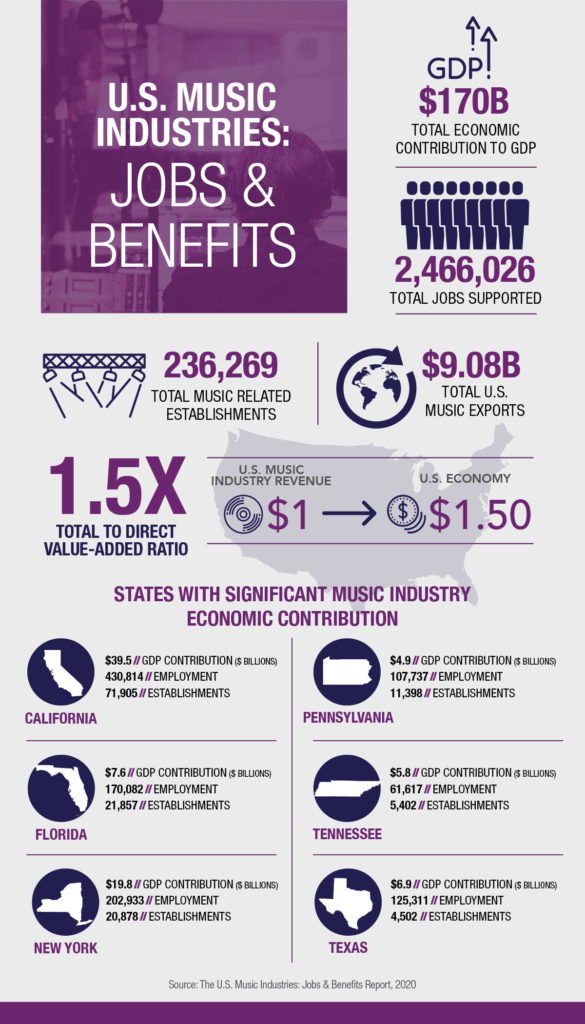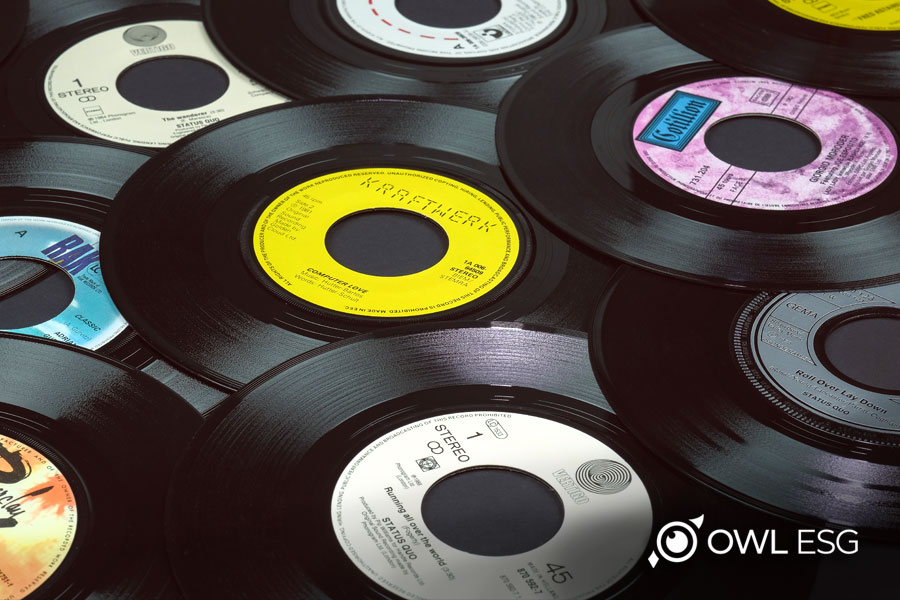Harmonizing with Nature: The Music Industry’s Green Revolution
The music industry is truly massive in its scope, impact, and economic influence. As an industry, in total, it generates more than $170 billion, increasing every year. This is built on more than $28.8 billion in revenues from recorded music. In fact, retail sales of merchandise is an industry unto itself, generating nearly $9 billion in revenue in 2021. With an expected 1.5x return on investments in the music-based industry and the biggest three companies controlling nearly 40 percent of the music business, the multi-faceted and far-ranging industry is attractive to many investors.

The cultural impact of music is difficult to quantify. Music has been at the forefront of compete paradigm shifts with major historical implications, from the civil rights movement to the fall of the Soviet Union. Musicians have changed norms and driven political and social change. Songs represent lovers, are a centerpiece of marriages, and bring back memories of young love. Lyrics promote mental health and have cemented a place in modern poetry as the next iteration of the keepers of humanity’s long oral history. Festivals have raised money and driven goodwill. Just recently, the attack on a music festival in Israel is a powerful symbol of authoritarian terrorism striking out against freedom.
Everything comes at a cost, though. Music is not only a powerful influence of culture and society; it is a significant source of environmental impact. Each year, the industry is directly responsible for approximately 540,000 tons of carbon emissions. This doesn’t count emissions from product production as well as emissions from travel for musicians and fans going to live shows. Streaming is not a huge source of electricity expenditure on a minute-by-minute basis, but the number of songs streamed each year is truly staggering, estimated at 2.74 trillion (with a t) in 2021.
Beyond greenhouse gas (GHG) emissions, live music, merchandise, and physical music sources (i.e., vinyl records and CDs) create waste, are water intensive, and can even damage fragile ecosystems where they are staged. But the industry is responding, coming together to find ways to continue to deliver in a sustainable way, looking at all the potentially troublesome outcomes it creates and seeking a creative solution.
The music industry, a powerful influencer of culture and society, has been increasingly recognizing the significance of Environmental, Social, and Governance (ESG) principles. In fact, it’s making strides towards a greener future, pledging to reduce greenhouse gas emissions (GHG) to net zero by 2050 and achieve a 50 percent reduction by 2030. Moreover, a group of leading music companies have signed the Music Climate Pact in response to the UN Climate Change Conference (COP26) and the crucial call for collective action to combat the climate crisis.
Launched through a partnership between the U.K.’s Association of Independent Music (AIM) and the BPI (which represents U.K. record labels) the Music Climate Pact has been endorsed by a diverse range of entities within the music industry.
Challenges the music industry faces and how they are responding
Vinyl
Vinyl, a type of plastic, raises environmental concerns given its composition and non-recyclability. Records are crafted from PVC (polyvinyl chloride) pellets and derived from fossil fuels, particularly crude oil. These pellets are extremely difficult to recycle, with a single record taking up to 1,000 years to fully decompose in a landfill.
Moreover, the vinyl manufacturing process demands significant energy for steaming and cooling. Traditionally, it employs ozone-depleting, solvent-based ink to print cover art. Despite these challenges, the vinyl resurgence continues, with 41.3 million sold globally last year.
Ninja Tune, a leading independent label in the U.K., has emphasized environmental sustainability by redirecting investments and pensions away from fossil fuels and adopting renewable energy systems at its London headquarters. The label also actively encourages their vinyl suppliers to transition to green energy, while their LA-based vinyl pressing plant uses soy-based inks, recycled boards, ethically made products, and 100 percent energy wind.
A group of eight Dutch companies known as Green Vinyl Records has also made significant strides in energy efficiency, achieving over 60 percent energy savings due to their environmentally friendly production process that’s based on the injection molding principle rather than pressing. Other ventures like Deep Grooves Vinyl Pressing Plant in the Netherlands operate entirely on green energy, and RPM Records offers different biodegradable, recycled, and wood-free paper alternatives.
Festivals
Music festivals, once a realm of nature-loving enthusiasts, underwent commercialization, evolving into a multibillion-dollar industry with waste emerging as a pressing concern. In the U.K., festival attendees alone use 10 million plastic bottles annually. Notable U.S. festivals like Coachella and Desert Trip produce about 100 tons of solid waste daily, with U.K. festivals generating an estimated 23,500 tons of waste each year.
However, there’s a positive shift towards sustainability in the festival landscape. U.K.’s Shambala, known for elaborate costumes, has embraced sustainability by eliminating meat and fish from its on-site catering and transitioned to renewable energy. Norway’s Øya festival stands out with its sustainable practices—serving food and drinks in 100 percent compostable, plastic-free packaging.
Italy’s Terraforma focuses on land restoration, promoting an ‘experimental and sustainable’ ethos while Green Man encourages attendees to donate unwanted food and camping gear to help refugees. Glastonbury, with one of the largest solar panels in the country, engages 1,300 recycling volunteers.
Touring
Musicians heavily rely on tours for revenue generation; however, the environmental impact is extensive, spans travel, merchandise, catering, and more. Fortunately, efforts are being made to make touring more sustainable.
While Coldplay’s 2022 eco-friendly world tour involved electricity-producing dance floors, Olivia Rodrigo’s recent Sour merch is sustainably dyed, made in the U.S., and crafted from 100 percent organic cotton. The 1975 delved into the world of sustainable fashion by repurposing old, unsold tees and printing new logos on them.
2021 marked the ‘European Year of Rail,’ with more DJs having chosen trains over flights for a reduced carbon footprint. For instance, Berlin-based DJ Gwenan cut back on flights as much as possible and discovered that many places were accessible by train. Nonetheless, while routing sometimes makes it impossible, artists are increasingly opting for flight alternatives whenever possible.
It’s no question that the music industry is committed to sustainability. The Music Climate Pact highlights this commitment, with signatories pledging to measure and reduce emissions, fostering transparency for a greener music market.
Artists like Coldplay, Adele, and Radiohead lead the way with eco-friendly tours and environmental advocacy while non-profits like REVERB play a crucial role in driving eco-friendly practices, emphasizing the importance of reducing plastic use. Despite challenges in vinyl production and at festivals, the music business is actively transitioning towards greener practices.
Artists going green
Coldplay
In October 2022, Coldplay joined the ranks of those committed to emission reduction. They pledged to cut CO2 emissions by 50 percent in their 2022 world tour compared to their 2016-17. Their tour also included almost entirely using renewable energy to power their stage show.
Using a kinetic floor, energy was created by fans during the show, solar panels were installed on the floors, stage, and elsewhere in open-air stadiums, and the stage itself was built from reusable and sustainable materials like bamboo and recycled steel.
Fans who committed to low-carbon travel received discounts at venues, and for every ticket sold, at least one tree was planted. To calculate emissions reductions, the band monitored how fans traveled to shows. Light-up wristbands worn by fans were created using compostable materials, ultimately reducing the production of them by 80 percent. Going even greener, confetti used was biodegradable.
Radiohead
Radiohead, known for their avant-garde music and environmental consciousness, show a strong aversion to carbon footprints. Their commitment to environmental causes includes aligning with organizations like Friends of the Earth.
When it comes to their tours, Radiohead prioritizes eco-friendliness by opting for ship transport instead of airfreight for their equipment, power their buses with biofuel, adopt reusable water flasks over disposable plastic cups, and urge fans to utilize public transportation for their shows, promoting the greenest options available.
Adele
Adele’s commitment to the environment extends beyond its benefits for the planet—it positively impacts her personal life as well. Her close associate, Simon Konecki, serves as the CEO of Drop4Drop, a U.K.-based charity focused on addressing the global water crisis by financing sustainable clean water solutions at local levels in various countries.
Despite her limited presence on social media, Adele uses her platform to express support for Drop4Drop and encourages fans to follow the cause, promising to become more active if 10,000 people started following the organization.
U2
U2’s commitment to environmental causes is remarkable, especially considering their involvement in critical social issues through (RED), UNICEF, and Amnesty International. Among their early eco-friendly endeavors was collaborating with Greenpeace in the early ‘90s to protest the Sellafield nuclear reprocessing site in England. Their recent partnership with Greenpeace focused on protesting the destruction of the Khimki forest in Russia, resulting in a successful effort to preserve this vital woodland.
Industry-wide movements towards sustainability
While the music industry has a significant environmental impact, it is unquestionably making strides towards a greener future, pledging to reduce greenhouse gas emissions (GHG) to net zero by 2050 and achieve a 50-percent reduction by 2030. Moreover, a group of leading music companies have signed the Music Climate Pact in response to the UN Climate Change Conference (COP26) and the crucial call for collective action to combat human impact on the environment.
Launched through a partnership between the U.K.’s Association of Independent Music (AIM) and the BPI (which represents U.K. record labels) the Music Climate Pact has been endorsed by a diverse range of entities within the music industry.
The founding endorsers encompass a wide spectrum of the music sector, featuring major music conglomerates such as Sony, Universal, and Warner, alongside globally acclaimed independents like Beggars Group, BMG, Brownswood Recordings, Ninja Tune, Secretly Group, Warp, and more.
Members pledge to share data, insights, and resources as well as offer support to artists to actively engage and advocate for climate-related concerns. CEO of Beggars group, Paul Redding, emphasizes that “the Music Climate Pact shows the willingness of the whole music industry to work collaboratively on climate issues. Building on IMPALA’s [Europe’s independent labels] project to develop a carbon calculator tool, all signatories will be pulling in the same direction on sustainability topics.”
The Music Climate Pact’s founding signatories commit to:
- Individually and collectively acting to measure and diminish GHG emissions across scopes 1, 2, and 3.
- Collaborating as an industry to formulate carbon-measurement approaches, tools, and models supported by climate science.
- Empowering artists to advocate for climate concerns.
- Partnering with common suppliers and digital streaming platforms to compile data and promote emission-reduction initiatives collaboratively.
- Transparently engaging with fans to communicate the music industry’s environmental impacts.
Beyond its signatories, the Music Climate Pact is reinforced by registered supporters—enterprises and groups involved in music creation and delivery, all aligned with the vision of a cleaner, efficient, and sustainable music market. Through these collaborations, the worldwide music sector is focused on innovation, presenting remarkable music to a vast audience while fostering cultural shifts that inspire transformation.
Non-profits going green
REVERB
Harry Styles, Billie Elish, Odesza, P!nk, Lorde, and The 1975 are going green during their tours, partnering with nonprofit organization REVERB to reduce concert and tour footprints by eliminating single-use water bottles and coordinating with local farm food to fuel sustainable biodiesel in tour buses.
Teaming up with REVERB, Dave Matthews’ Bama Green Project enlightens global fans on easy, impactful ways to contribute to Earth’s preservation. By utilizing a biodiesel-powered tour bus, minimizing waste, and opting for local food during tours, Matthews’ band successfully offset the carbon emissions from their entire touring history.
Since 2020, the band has successfully planted over three million trees through its partnership with The Nature Conservatory. Concert attendees can actively participate in this initiative by contributing an optional $2 donation per ticket, which will fund the planting of a tree through The Nature Conservancy’s Plant a Billion Trees campaign. This campaign is a significant effort aimed at global reforestation with the objective of planting one billion trees worldwide.
Smaller artists and local venues also have the power to contribute to a healthier planet. By assessing their energy consumption, merchandise choices, and materials used, venues of all sizes can play a part in fostering positive change. MusicClimateRevolution.org, provided by REVERB, offers guidance to venues, musicians, festivals, fans, and labels on adopting eco-friendly practices.
REVERB stands alongside other non-profit organizations dedicated to creating a greener music industry. These include Activist Artists Management, Music Declares Emergency, and the Jerry Garcia Foundation, named in honor of the late lead vocalist of The Grateful Dead.
In essence, the music industry’s sustainability journey is gaining traction, uniting in the pursuit of an environmentally conscious future. The commitment to preserving the planet aligns with the industry’s belief that there’s no music on a dead planet, underscoring the urgency of collective action in the face of the global climate crisis.




